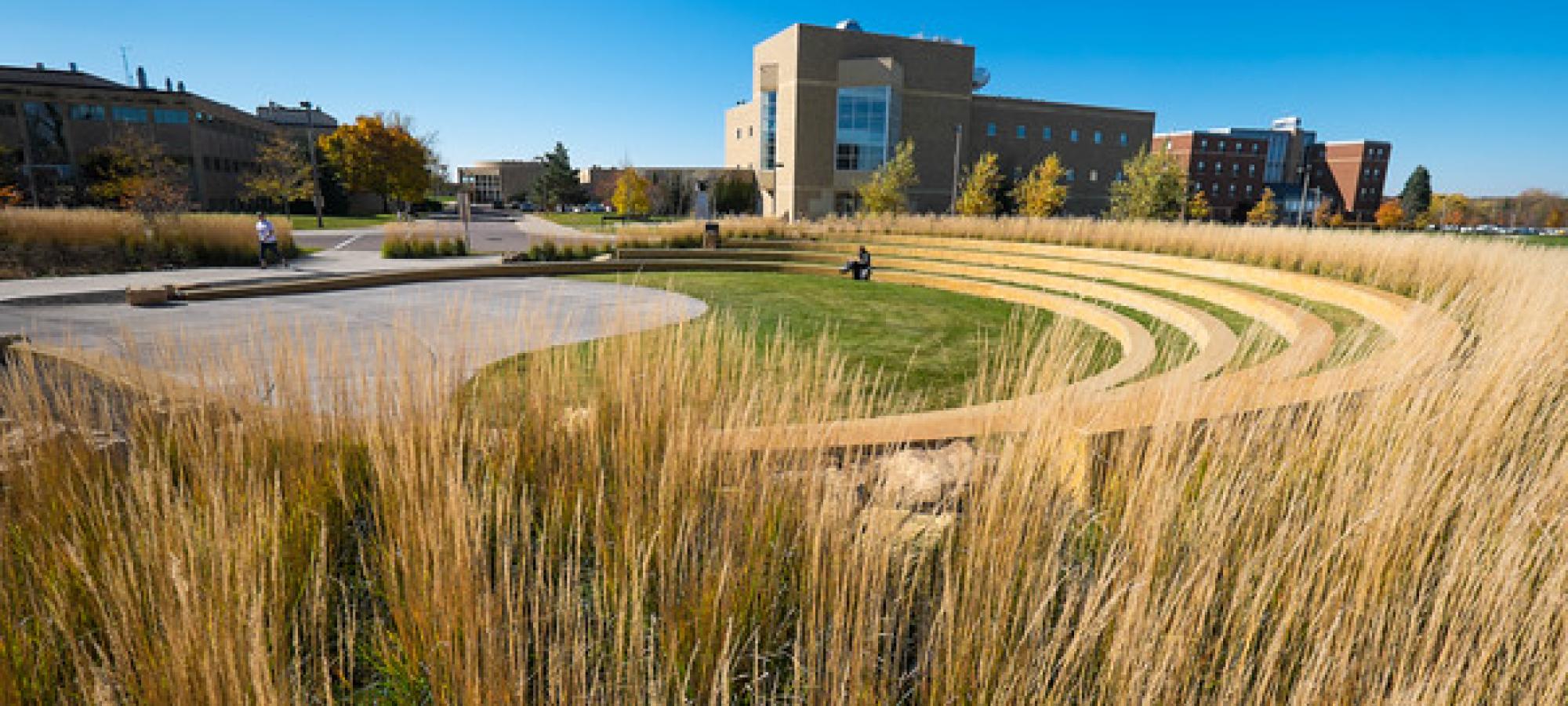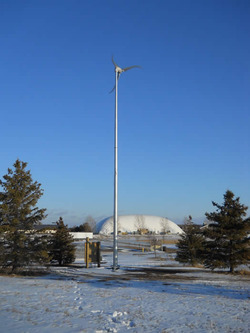Johnson Center for Environmental Innovation
The Johnson Center for Environmental Innovation supports environmental sustainability on the Gustavus Adolphus campus and in the surrounding communities while equipping students to continue that work in their lives beyond Gustavus. To accomplish this mission, the Johnson Center works as a catalyst for environmental innovation on and off campus with the broadest understanding of innovation: not only technical innovation, but also business, policy, and social innovation.
The Johnson Center for Environmental Innovation was established thanks to the generous support of Glen and Lavonne Johnson. Glen Johnson attended Gustavus for one year until financial difficulty halted his pursuit of formal education. He went on to a distinguished career as a newspaper editor, government official, and money market fund executive.
In addition to a career in business and finance, LaVonne has been an ardent supporter of education and the arts. Both have been strong supporters of Gustavus over the years, with Glen having served on the Gustavus Board of Trustees. A restored wetland on Glen’s family farm has also been made available as a field laboratory for Gustavus students.

Gold Rating for Sustainability
Gustavus Receives STARS Gold Rating for Sustainability Achievements
The STARS (the Sustainability Tracking, Assessment & Rating System) measures and encourages sustainability in all aspects of higher education.
Zero-Waste and Compost
In 2019 the College started moving towards a goal of achieving zero waste on campus, defined as diverting 90% of our waste away from landfills and incineration. When the goal was set we were at 36% diversion, and we are at 61% diversion.
Working towards zero waste means moving away from a consumption-based linear system and to a more circular, sustainable cycle of use. Becoming a zero waste institution involves both personal responsibility of those in this community and institutional responsibility to commit to reducing our environmental impact.
With an industrial-grade composter on campus, Gustavus is highly intentional about collecting and diverting food waste in a productive way. Food scraps, compostable utensils, compostable containers and some landscaping waste are all collected. Compost bins are readily accessible within the Jackson Campus Center and collection occurs daily during the academic year. Upon completion of the process, fresh compost is reintegrated across campus and is used both for landscaping and food production at Big Hill Farm.
Composting at Gustavus
Composting has become an important part of the Gustavus campus community waste reduction strategies because compost enriches the soil as well as reduces methane emissions from landfills, which ultimately lowers our carbon footprint.
Compost is a mixture of decaying material. It includes both carbon-rich browns (like leaves, sawdust, and hay) as well as nitrogen-rich greens (like vegetables, fruits, and grass clippings). This decomposition produces a dark, nutrient-rich mixture that can be used to fertilize crops.
Gustavus utilizes industrial composting systems, which are large enough to gather sufficient energy to break down items that a smaller backyard composter can’t.
This includes BPI certified items from the Marketplace, Courtyard Cafe, and STEAMery like coffee cups, clamshell to-go boxes, fruit cups, greenware utensils, stir sticks, and napkins.
Food products including fruits, vegetables, dairy products, eggs, fish, and meat are all compostable at Gustavus. You can also compost tea bags and coffee grounds here.
We have two compost systems on campus:
- Our composter, located near Facilities, produces compost that is used by Big Hill Farm, flower beds on campus, and other projects.
- A large organics compactor, which is taken to the Shakopee Mdewakanton Sioux Community Organics Recycling Facility and turned into high-quality compost and sold to the community.
Residential Halls Composting FAQ's
Yes! In 2021 the Johnson Center for Environmental Innovation, Facilities, and Student Senate collaborated to develop a program that provides mini green compost bins in each residential unit on campus. You can collect compostable items in these green two-gallon bins and empty them into the yellow compost curbie at the waste station for your dorm at least once per week. These bins were purchased by Student Senate and are the permanent property of the college, so you should clean your bin thoroughly and leave it in your room at the end of the school year.
Yes. BPI certified compostable bags are provided at no cost with the mini-bins or in your hall's laundry room. Compostable bags make the compost drop-off process extra easy. Please do not use regular plastic bags, since they are not compostable, unless you throw the plastic bags in the trash, not compost, when you empty your bin.
Empty your mini-bin into the large yellow compost curbie, located at the waste station for your hall. These stations may be inside or outside, depending on the layout of the hall.
Grounds staff brings compost curbies to the compactor & composter located near Facilities on Mondays and Thursdays, typically.
The food scraps in your compost bin should not smell any worse than when you place them into a trash can. Emptying your bin regularly (1-3x per week) is the best way to manage any unpleasant odors. You have the option to purchase an inexpensive carbon filter which can trap odors. These filters should be replaced every 3 months.
Fruit flies are drawn to rotting food, whether it’s in a trash or a compost bin. It is important to empty the bin frequently, 1-3x per week. If fruit flies have found your bin, empty it and clean it thoroughly. You might need to temporarily discontinue using the bin until the fruit flies have disappeared. To trap the flies you can pour ½ cup of apple cider vinegar into a small bowl or cup, then mix in a few drops of dish soap, no more than 1 tsp. The flies will land in the mixture and be unable to escape. Resume composting once the flies are gone and remember to empty your bin more regularly. Apple cider vinegar and dish soap are provided in most common kitchens with instructions for making a fruit fly trap.
Use a paper towel to wipe any solid residue out of the bin (you can compost the paper towel too). Then rinse any leftover juices from the bin with a little bit of water. Make sure the bin is free of any residue.
Why can't I just dump compost remnants down the drain?
These remnants will clog up the drain, resulting in a headache for you and building services staff. Please take care to not wash any solid particles down the drain!
Yes, both the cardboard box and the pizza grease will break down in an industrial composter. However, you must remove any plastic inserts or metal utensils from the box.
The condition of these bins is included in the Room Condition Reports issued by Residential Life during move-out and you will be fined if your bin is dirty, damaged, or missing at the end of the year.
Can I take my mini-bin with me if I change housing assignments or when I leave at the end of the year?
No, mini-bins must stay in the room they were assigned to at the beginning of the year. If you remove the bin from your room you will be fined a replacement fee.
Energy Usage
Gustavus takes seriously its commitment to a carbon neutral future and is making significant progress on reducing our greenhouse gas emissions in order to show our students and the rest of the world that it can be done. We might not think about it every day, but as a campus, we use a significant amount of electricity for cooling and day-to-day operations, natural gas and oil for heating, and petroleum products for transportation which makes our greenhouse gas footprint quite large. Climate change is at the forefront of our decision-making as we develop new educational programs, bring new buildings online, and update our facilities to recruit the students of the future. At Gustavus, we believe that all our students must learn why care of the environment is important and how to do it, so they can share their knowledge with their future communities.
1MW solar field - Arbor View
-
1.1 megawatt D.C. solar field on Gustavus campus near Arbor View apartments
-
Provides 10% of campus electricity usage
-
Utilized for student and faculty research projects
-
1MW = equivalent of powering our two largest residential halls, Southwest Hall and Norelius Hall
-
25x larger than 2nd largest array: 40kw on Beck Hall
-
MN native shortgrass prairie planted underneath to establish habitat for pollinators
-
Partners: Gustavus Facilities, Gustavus Johnson Center for Environmental Innovation, City of St. Peter, SMMPA, and installed by Solar Connection Inc.
Solar thermal—Melva Lind Interpretive Center

Side-by-side demonstration of flat plate (Solar Skies) and evacuated tube solar (Apricus) collectors
Supplements building heat
Installation by Johnson Center (TraverSoleil LLC)
Partial funding from Clean Energy Resource Teams
Solar thermal—Jackson Campus Center
16 Next Generation Energy NGE-224-TU panels
Ballast mounted to avoid roof penetrations
Supplies partial water heating to Campus Center (includes Dining Services)
Installation by Energy Concepts, Inc. of Hudson, WI
Donor funded
Solar thermal—Lund Center

24 Solar Skies SS-40 panels
Supplies partial pool heating and domestic hot water
Uses an existing storage tank installed in 1984 in anticipation of solar
Installation by Energy Concepts, Inc. of Hudson, WI
Donor funded
Solar thermal—Beck Academic Hall
60 Solar Skies SS-40 flat plate panels
Provides building heat and summer air conditioning reheat
Installation by subcontractors under LKBP Engineers, Inc.
Donor funded
Solar electric—Olin Hall
Three technologies side-by-side:
- TenK 180 Watt panels (RAIS system) with reflectors and Sunergy low voltage inverter design. Installation by Zinniel Electric of Sleepy Eye, MN.
- Siliken 240 Watt PV panels with central PV Powered/Advanced Energy inverter. Installation by ABLE Energy, Inc of River Falls, WI
- Siliken 240 Watt PV panels with Enphase microinverters. Installation by ABLE Energy, Inc of River Falls, WI
All located on an accessible roof for student access.
Donor funded
Data monitoring
Solar electric—Beck Academic Hall

40 KW system installed by ABLE Energy, Inc.
ReneSolar 250W panels
Donor funded
Data monitoring online
Wind electric—Big Hill Farm
Skystream 3.7 turbine (2.1 KW rated power @ 24.6 mph)
45-ft hinged monopole tower
Turbine and tower supplied by Today’s Alternatives of St. Peter, MN
Installed January 2012 by Gustavus Physical Plant staff
Funded by the National Science Foundation
Energy Reports
Gustavus updates our utility data regularly for use in class projects and research. Datasets for electricity usage, natural gas usage (heating and cooling), water use, and fuel oil.
Energy use: Building Names and Codes
Gustavus buys its electrical supply from the City of St. Peter. There is one central distribution point for all campus buildings with the exception of the houses east of 7th Street and Arbor View Apartments.
Gustavus receives its natural gas supply from CenterPoint Energy/Minnegasco. Each building is individually metered.
Gustavus receives its water from the City of St. Peter. In turn, the City also takes the waste water for processing. Each building has its own water meter, with some buildings have three meters, one for the building, one for the chiller unit, and one for outside irrigation use.
Gustavus purchases low-sulfur fuel oil for use by the Heating Plant boilers during times of curtailment by CenterPoint Energy. This normally happens during extremely cold temperatures or prolonged periods of abnormally cold temperatures. Curtailment can also occur in the event of natural gas supply interruption or heavy use elsewhere in the country.




